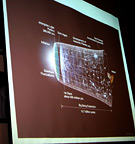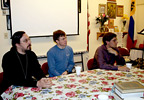Symposium on the topic of religion and science was held at the Church of the Epiphany in Boston
 On Saturday, May 9, the first parish symposium on the topic of religion and science was held at the Church of the Epiphany in Boston, MA. Three presentations were given: "An overview of the Problems of Science and Religion from a Pastoral Perspective," by Priest Victor Boldewskul, Rector of the Epiphany Church; "An Astronomer's Reading of the Bible and Creation Narative," by Professor Alexey Vikhlinin, (Harvard-Smithsonian Center for Astrophysics); and "The Search for Balance between Faith and Science," by Dr. Vladislav Zarayskiy (Ph. D. graduate of the Department of Molecular Medicine at the Boston University School of Medicine).
On Saturday, May 9, the first parish symposium on the topic of religion and science was held at the Church of the Epiphany in Boston, MA. Three presentations were given: "An overview of the Problems of Science and Religion from a Pastoral Perspective," by Priest Victor Boldewskul, Rector of the Epiphany Church; "An Astronomer's Reading of the Bible and Creation Narative," by Professor Alexey Vikhlinin, (Harvard-Smithsonian Center for Astrophysics); and "The Search for Balance between Faith and Science," by Dr. Vladislav Zarayskiy (Ph. D. graduate of the Department of Molecular Medicine at the Boston University School of Medicine).Fr. Victor greeted the audience and lecturers, expressing his hope that the symposium would lay the foundation for further development on this topic. In his presentation, Fr. Victor suggested that the perceived contradiction between religion and science in modern society in both Russia and West constitutes an impediment to pastoral and missionary activity. This fallacious notion regarding the relationship between science and religion is aggressively propagandized in the mass media and institutions of higher education. Growing up an Orthodox child will learn at home and in school that God always existed and that He created the world out of nothing in seven days. He will also learn about his Guardian Angel, the creation of Adam and Eve, the Tower of Babel, the Flood, the Incarnation of the Son of God and Christ's Resurrection. But as the child grows, he is exposed more and more to an anti-religious culture which, making use of science, presents religion as delusional. For many youths, this clash between two opposing worldviews elicits a spiritual crisis; it is therefore necessary for the Church to take up this question. In Fr. Victor's opinion, the Orthodox response to this challenge cannot be reactionary. Unfortunately, in response to atheists' attacks Orthodox apologists often allow their opponents to set the terms of the debate. In an attempt to render a proper rebuttal they adopt a manner similar to American Protestants, and thus appear as the caricature of anti-science religious fanatics, a caricature initially created by atheist propagandists. Fr. Victor is certain that it is possible to combine a respect for scientific discovery with Orthodox dogmas. In his conclusion, Fr. Victor expressed his hope that all realms of science be illumined by the Spirit of Truth, as well as his conviction that this possibility now exists, thanks to the resurgence of the Russian Church (to read Fr. Viktor's comments click here).
 Professor Vikhlinin began his presentation with a quote from the Lenten Triodion: "...God commanded Adam to concern himself will all other elements and qualities, reasoning with his mind to the glory of God; for this is true nourishment. But he was not to search for the divine essence: God, who He is, where He is and how He brought all things into being out of nothingness. Yet to his own harm Adam, having no care for the other things, sought to examine God and to determine His essence; and since he was not perfect but still a simple child, he failed in his undertaking, when through Eve Satan planted in him the desire of becoming Godlike." That is, God Himself commanded Adam to reason with his mind about the elements of the world, though simultaneously commanded him not to attempt comprehension of the Divine nature with human logic. Consequently, honest scientific research is first and foremost the fulfillment of God's command.
Professor Vikhlinin began his presentation with a quote from the Lenten Triodion: "...God commanded Adam to concern himself will all other elements and qualities, reasoning with his mind to the glory of God; for this is true nourishment. But he was not to search for the divine essence: God, who He is, where He is and how He brought all things into being out of nothingness. Yet to his own harm Adam, having no care for the other things, sought to examine God and to determine His essence; and since he was not perfect but still a simple child, he failed in his undertaking, when through Eve Satan planted in him the desire of becoming Godlike." That is, God Himself commanded Adam to reason with his mind about the elements of the world, though simultaneously commanded him not to attempt comprehension of the Divine nature with human logic. Consequently, honest scientific research is first and foremost the fulfillment of God's command.When we speak of the relationship between science and religion, the question most often raised concerns the correlation of events described in the Holy Scripture with contemporary knowledge. We believe that the Holy Scripture is Divinely-inspired and for this reason is true as a whole. Seemingly contradictions with modern science should not trouble us; firstly, because we can too narrowly interpret the meaning of the Bible; and secondly, because we must understand that science never gives us an exhaustive view of the world. In support of these hypotheses, Prof. Vikhlinin brought forth a series of examples in which Christ Himself points out the limited understanding of the Law among His contemporaries, and also mentioned an instructive story involving an atheistic critique of the first verses of the Book of Genesis. In the 19th century, ideas about the static and ever-existent nature the universe prevailed. Scorn was especially heaped upon the description of the creation of light before the sun and stars. Modern understandings of the stages of the evolution of the Universe, however, are much closer to the expanded interpretations of the events of the Six Days (which, for instance, includes an identification of "the heaven and the earth" in the first verse of Genesis as the spiritual and material worlds, respectively - Blessed Augustine) than to those of science in the 19th Century. And so the material world, as we know it, had a clear, delineated beginning - the end of the epoch of inflationary expansion; at first the material world was remarkably void; the first component of the material that began to fill the newly formed universe was light - cosmic microwave background radiation, etc.
 Dr. V. Zarayskiy discussed the writings of St. Anastasius of Sinai, who was a disciple of St. John of the Ladder and interpreted the Six Days differently than St. Basil the Great. St. Anastasius called upon the people to find a balance between the literal meaning of Holy Scripture and its spiritual meaning.As before, many people consider science and religion to be incompatible, though if a balance if found between them, then no conflict between the two exists.
Dr. V. Zarayskiy discussed the writings of St. Anastasius of Sinai, who was a disciple of St. John of the Ladder and interpreted the Six Days differently than St. Basil the Great. St. Anastasius called upon the people to find a balance between the literal meaning of Holy Scripture and its spiritual meaning.As before, many people consider science and religion to be incompatible, though if a balance if found between them, then no conflict between the two exists.  Dr. Zarayskiy noted that many historical collisions between science and religion occurred when people insisted on a purely literal interpretation of Holy Scripture, comparing it to contemporary scientific understandings. When the Holy Fathers wrote about science, they relied on scientific knowledge available to them at the time. Furthermore, their opinions do not constitute dogma. For this reason, it is important to take into account the historical context of these writings. Dr. Zarayskiy pointed the difference between a text's being God-inspired or its being God-given. In his opinion, the inspiration by God of the Holy Scripture is "a synergy of interaction between the God-inspired texts themselves and the historical, geographical, and scientific traditions in force at the time of their composition." An honest and conscientious approach to faith and science gives man the possibility to cognize the world of God by both spiritual and scientific paths.
Dr. Zarayskiy noted that many historical collisions between science and religion occurred when people insisted on a purely literal interpretation of Holy Scripture, comparing it to contemporary scientific understandings. When the Holy Fathers wrote about science, they relied on scientific knowledge available to them at the time. Furthermore, their opinions do not constitute dogma. For this reason, it is important to take into account the historical context of these writings. Dr. Zarayskiy pointed the difference between a text's being God-inspired or its being God-given. In his opinion, the inspiration by God of the Holy Scripture is "a synergy of interaction between the God-inspired texts themselves and the historical, geographical, and scientific traditions in force at the time of their composition." An honest and conscientious approach to faith and science gives man the possibility to cognize the world of God by both spiritual and scientific paths.After a lively discussion, Fr. Victor thanked the lecturers and expressed his hope that discussions on this topic will continue at the second symposium which is to take place in October of this year, and at the third which is to take place in the spring of 2010. It is hoped that a live feed of future symposia will be available online. Thanks to the multitude of specialists in number of fields among the parishioners, it was suggested that symposia on other topics be held in the future as well.